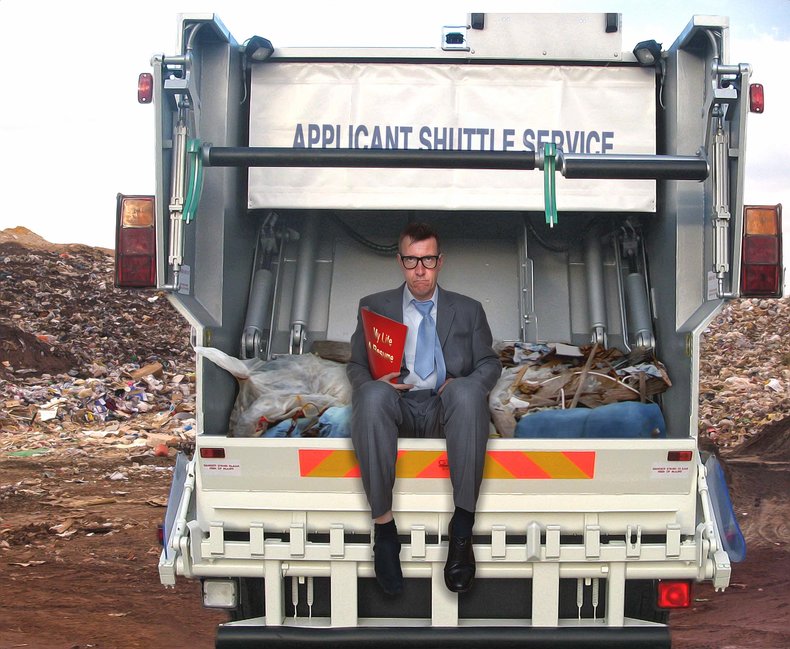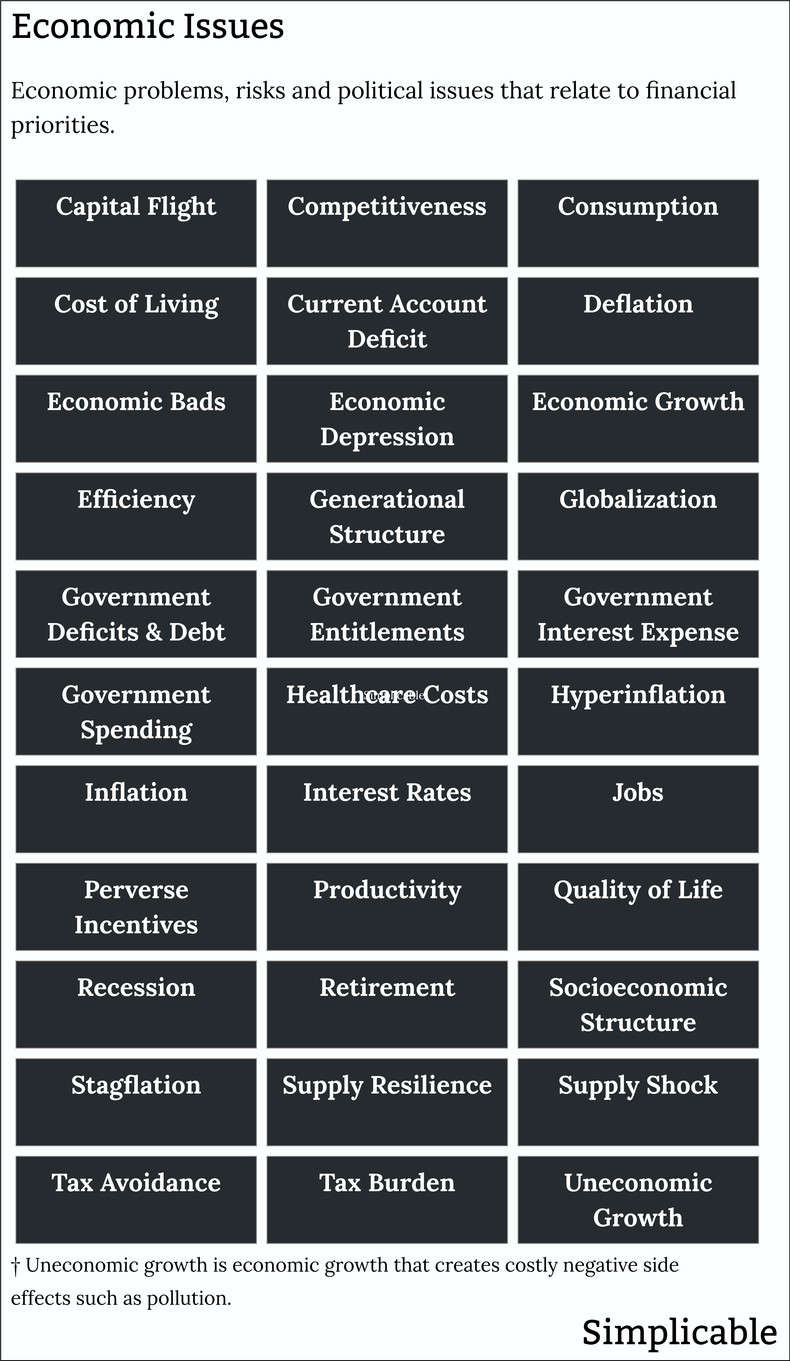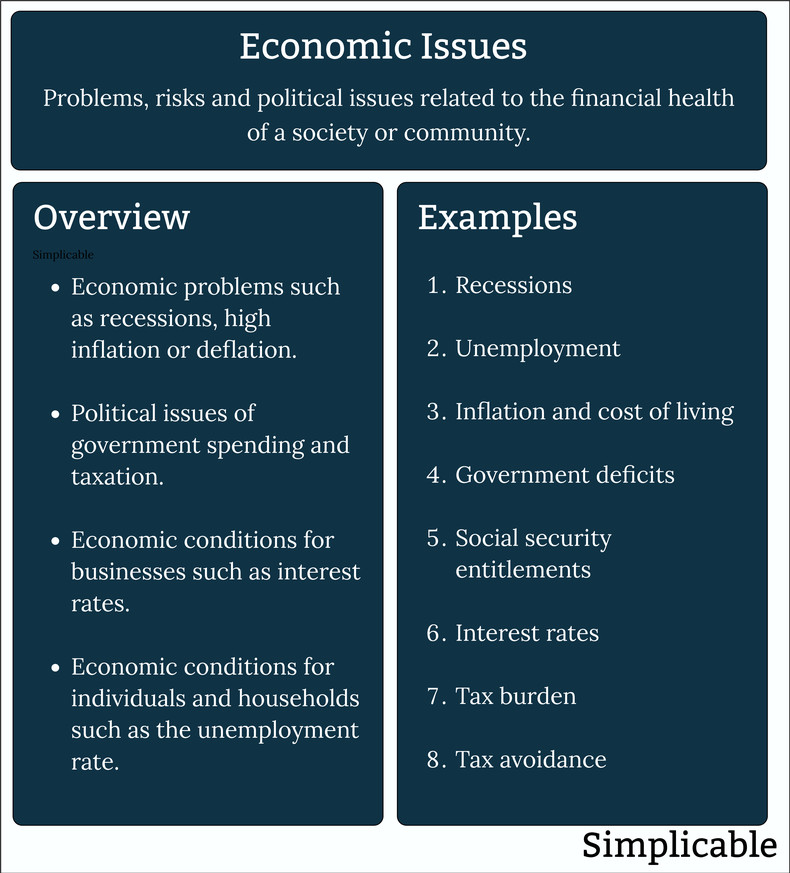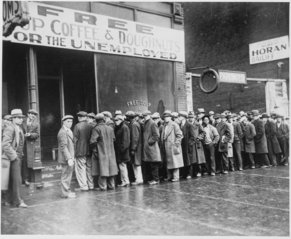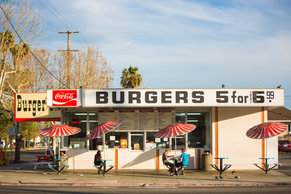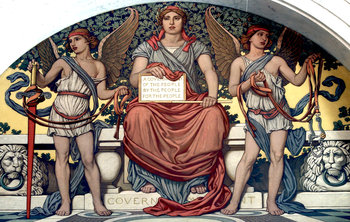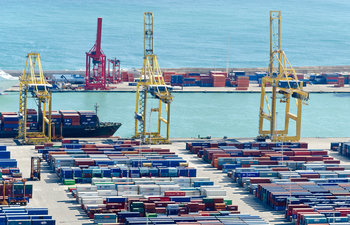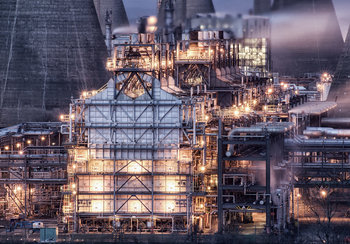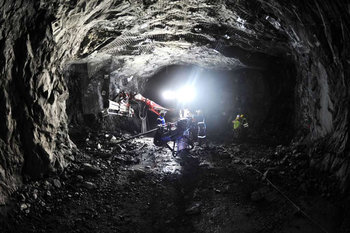|
| |
Economic issues are economic priorities, risks and problems. These are inherently political as people have different economic priorities and views on how to each achieve priority. The following are common economic issues.
Government SpendingHow much and in what direction the government spends. For example, cronyism whereby government spending is intended to enrich an elite.Government Deficits & DebtA deficit is spending that exceeds government revenues. Government debt is the total debt obligations that a government has accumulated, often due to many decades of deficits with interest.Government Interest ExpenseThe cost to service interest on government debt. This can consume a government's resources or can effectively spiral out of control where there is a very large debt relative to the productive capacity of a nation.
Government EntitlementsThe commitments a government has made for future spending to persons or units of the government. For example, social security, medical coverage and unemployment insurance programs.Socioeconomic Structure Progress with regards to the socioeconomic structure of society. For example, growing the middle class, eliminating poverty and preventing the excessive concentration of wealth within a small elite.Generational StructureA situation where wealth and opportunity are concentrated in a particular generation. This can occur where a large generation produces high economic growth followed by a speculative bubble and economic collapse such that a generation leaves behind large structural problems for the next generation.Cost of LivingThe cost of living in nations, regions or cities. For example, a city that has become too expensive for most residents due to excessive international investment in the city's real estate.Quality of LifeThe direct goal of an economy is to produce value but the end goal of economic systems is to produce quality of life. This is usually measured as people's self-reported life satisfaction and indicators in areas such as health, longevity and standard of living.RetirementThe degree to which societies, private pensions and families are prepared for retirement. For example, a low savings rate amongst an aging population.ConsumptionThe amount of consumption that occurs. For example, a period of unsustainable high personal consumption driven by high interest debt such as credit cards.Healthcare CostsIn some societies, healthcare spending becomes remarkably large such that management of these costs is an important element of government spending. In nations without national healthcare, this can represent a large risk for individuals that creates social instability.GlobalizationThe degree to which an economy and society open to the world. For example, trade barriers that protect a particular industry from international competition.Current Account DeficitA situation where the amount you export is less than the amount you import. This is often viewed as a problem or unsustainable situation where consumption is too high relative to the value you are creating.Interest RatesInterest rates are managed by a nation as part of monetary policy. This represents financial gravity that has an large influence on investment, economic activity, inflation and exchange rates. For example, a nation can potentially cool a speculative housing market by increasing interest rates.Tax AvoidanceA tendency for large firms and wealthy individuals to have access to aggressive tax strategies and structures.Tax BurdenA high tax burden on companies or individuals that cause economy disincentives or poor quality of life.Capital FlightCapital flight is a tendency for capital to leave a nation, state or city where there are high taxes and other burdens such as red tape.JobsThe unemployment rate, availability of high paying jobs and other factors such as the minimum wage.ProductivityProductivity is the amount of value created in an hour of work. A high productivity rate is the basis for an advanced economy with a high quality of life.EfficiencyEfficiency is the amount of value created with a unit of a resource such as an acre of land or gallon of water. This is another basis for an advanced economy.CompetitivenessThe ability of a nation to compete with other nations in a free trade environment. Supply ShockA sudden disruption to the supply of an important material, component, part or good.Supply ResilienceA nation's exposure to supply risks. For example, a nation that depends on the global supply chain for much of its food and medicine.Economic GrowthGrowing the value creation of an economy. Often a priority due to the basic human motivation to grow and thrive.Uneconomic Growth Economic growth that produces excessive economic bads such that it represents a pyrrhic victory.Economic BadsEconomic bads are negative effects from the production of economic goods such as pollution or extinction of a species.Tragedy of the CommonsTragedy of the commons is a tendency for common resources to be used up or destroyed. For example, if every nation fishes a shared fish stock with high value none may have incentives not to drive the species to extinction unless all nations cooperate to prevent this from happening.RecessionA period of at least two consecutive quarters of negative economic growth.Economic Depression A sharp economic contraction of at least 10% or long recession of more than 2 years. InflationInflation is the increase in the price of goods in a period of time. A little inflation tends to be a reasonable target as this encourages consumption. High inflation or hyperinflation leads to significant economic inefficiencies. For example, sellers have incentive not to sell their goods as they will receive higher prices the longer they wait. This can lead to a complete breakdown in normal economic functions.DeflationDeflation is a decrease in the price of goods in a period of time. This produces negative effects as consumers have incentive not to spend when prices are regularly going down.Irrational ExuberanceIrrational exuberance is a situation where prices for assets and securities are inflated due to factors such as misinformation and a fear of missing out. This produces negative effects on the economy as it can cause firms and individuals to take on too much risk eventually resulting in bankruptcies that can reverberate through the financial system.Perverse IncentivesPerverse incentives is a situation where market participants are given incentives that will tend to lead to financial mismanagement. For example, a financial advisor who is given large bonuses if they grow their client's money but suffers no cost if they lose their client's money.StagflationInflation is normally associated with strong economic conditions that cause prices to rise. Stagflation is a period of recession or economic stagnation that also has high inflation. This is difficult to resolve as raising interest rates to drive down inflation will tend to worsen economic stagnation.HyperinflationInflation that has entered into a vicious cycle, often due to fiscal dominance whereby a government engages in ever escalating money creation in order to continue to operate in the face of a high debt. SummaryThe following are common examples of economic issues.OverviewEconomic issues include problems such as recessions, conditions such as interest rates and political issues such as taxation.Next: Economic Problems
Economic Problems
This is the complete list of articles we have written about economic problems.
If you enjoyed this page, please consider bookmarking Simplicable.
© 2010-2023 Simplicable. All Rights Reserved. Reproduction of materials found on this site, in any form, without explicit permission is prohibited.
View credits & copyrights or citation information for this page.
|
